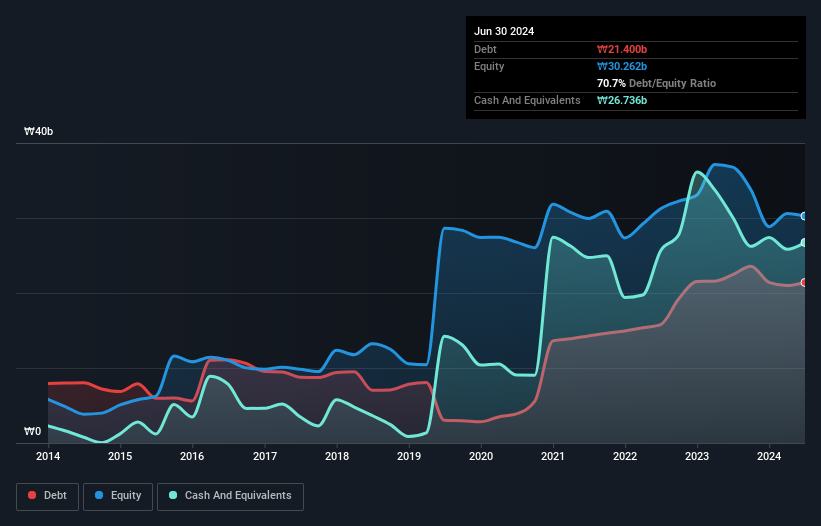
Warren Buffett famously said, 'Volatility is far from synonymous with risk.' So it might be obvious that you need to consider debt, when you think about how risky any given stock is, because too much debt can sink a company. Importantly, NIBEC Co., Ltd. (KOSDAQ:138610) does carry debt. But is this debt a concern to shareholders?
What Risk Does Debt Bring?
Generally speaking, debt only becomes a real problem when a company can't easily pay it off, either by raising capital or with its own cash flow. Part and parcel of capitalism is the process of 'creative destruction' where failed businesses are mercilessly liquidated by their bankers. However, a more frequent (but still costly) occurrence is where a company must issue shares at bargain-basement prices, permanently diluting shareholders, just to shore up its balance sheet. Having said that, the most common situation is where a company manages its debt reasonably well - and to its own advantage. When we think about a company's use of debt, we first look at cash and debt together.
View our latest analysis for NIBEC
What Is NIBEC's Net Debt?
The image below, which you can click on for greater detail, shows that NIBEC had debt of ₩21.4b at the end of June 2024, a reduction from ₩22.4b over a year. However, it does have ₩26.7b in cash offsetting this, leading to net cash of ₩5.34b.

How Strong Is NIBEC's Balance Sheet?
We can see from the most recent balance sheet that NIBEC had liabilities of ₩30.6b falling due within a year, and liabilities of ₩6.35b due beyond that. Offsetting these obligations, it had cash of ₩26.7b as well as receivables valued at ₩7.71b due within 12 months. So its liabilities total ₩2.50b more than the combination of its cash and short-term receivables.
Having regard to NIBEC's size, it seems that its liquid assets are well balanced with its total liabilities. So while it's hard to imagine that the ₩241.3b company is struggling for cash, we still think it's worth monitoring its balance sheet. Despite its noteworthy liabilities, NIBEC boasts net cash, so it's fair to say it does not have a heavy debt load! The balance sheet is clearly the area to focus on when you are analysing debt. But you can't view debt in total isolation; since NIBEC will need earnings to service that debt. So if you're keen to discover more about its earnings, it might be worth checking out this graph of its long term earnings trend.
In the last year NIBEC wasn't profitable at an EBIT level, but managed to grow its revenue by 11%, to ₩19b. That rate of growth is a bit slow for our taste, but it takes all types to make a world.
So How Risky Is NIBEC?
Statistically speaking companies that lose money are riskier than those that make money. And the fact is that over the last twelve months NIBEC lost money at the earnings before interest and tax (EBIT) line. Indeed, in that time it burnt through ₩7.9b of cash and made a loss of ₩4.8b. While this does make the company a bit risky, it's important to remember it has net cash of ₩5.34b. That kitty means the company can keep spending for growth for at least two years, at current rates. Summing up, we're a little skeptical of this one, as it seems fairly risky in the absence of free cashflow. There's no doubt that we learn most about debt from the balance sheet. But ultimately, every company can contain risks that exist outside of the balance sheet. Case in point: We've spotted 3 warning signs for NIBEC you should be aware of, and 1 of them makes us a bit uncomfortable.
Of course, if you're the type of investor who prefers buying stocks without the burden of debt, then don't hesitate to discover our exclusive list of net cash growth stocks, today.
Valuation is complex, but we're here to simplify it.
Discover if NIBEC might be undervalued or overvalued with our detailed analysis, featuring fair value estimates, potential risks, dividends, insider trades, and its financial condition.
Access Free AnalysisHave feedback on this article? Concerned about the content? Get in touch with us directly. Alternatively, email editorial-team (at) simplywallst.com.
This article by Simply Wall St is general in nature. We provide commentary based on historical data and analyst forecasts only using an unbiased methodology and our articles are not intended to be financial advice. It does not constitute a recommendation to buy or sell any stock, and does not take account of your objectives, or your financial situation. We aim to bring you long-term focused analysis driven by fundamental data. Note that our analysis may not factor in the latest price-sensitive company announcements or qualitative material. Simply Wall St has no position in any stocks mentioned.
About KOSDAQ:A138610
NIBEC
A healthcare company, engages in the manufacture and sale of dental bone grafts and tissue regenerative collagen products in South Korea and internationally.
Excellent balance sheet and slightly overvalued.
Market Insights
Community Narratives


